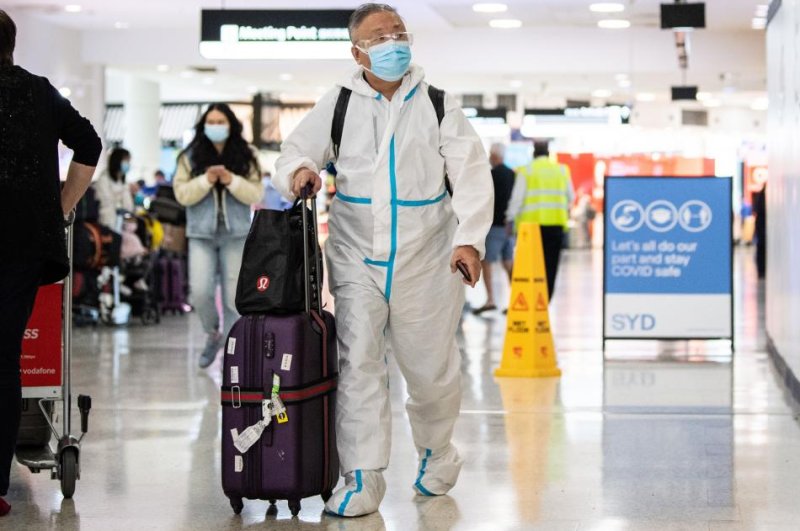Travelers wearing personal protective equipment (arrive at Sydney International Airport in Sydney, New South Wales Australia, on Monday, a the Omicron variant of of COVID-19 has been detected in that country. Photo by James Gourley/EPA-EFE
Nov. 29 (UPI) -- The World Health Organization has warned that the Omicron variant of the COVID-19 virus could lead to "severe consequences" in some parts of the world because of its ability to change and dodge efforts to block it.
The global health organization made the observation in a technical brief about the newest coronavirus strain that was first detected in South Africa. The United States, Britain and the European Union all have responded with travel bans from countries where it has been detected.
What particularly concerns health officials is Omicron's ability to mutate, up to 26 to 32 times in the spike, allowing it to spread quickly around the world because of its "immune escape potential and higher transmissibility."
"Given mutations that may confer immune escape potential and possibly transmissibility advantage, the likelihood of potential further spread of Omicron at the global level is high," the WHO said in the brief issued late Sunday.
"Depending on these characteristics, there could be future surges of COVID-19, which could have severe consequences, depending on a number of factors including where surges may take place. The overall global risk related to the new VOC Omicron is assessed as very high."
The WHO called for "enhanced surveillance and sequencing efforts" to better understand the Omicron variant and its impact on the larger society.
Dr. Angelique Coetzee, the South African doctor who first confirmed the new COVID-19 variant, told BBC News that the symptoms her patients experienced so far have been "extremely mild," but she cautioned more time was needed before the seriousness in vulnerable people can be accurately gauged.
"It actually started with a male patient who's around the age of 33 ... and he said to me that he's just [been] extremely tired for the past few days and he's got these body aches and pains with a bit of a headache," Coetzee said.
She said the patient had not developed a cough or loss of taste or smell, both common symptoms connected with other coronavirus strains.
"What we are seeing clinically in South Africa -- and remember I'm at the epicenter of this where I'm practicing -- is extremely mild, for us [these are] mild cases. We haven't admitted anyone, I've spoken to other colleagues of mine and they give the same picture."
The rapid spread of the variant continued to worry scientists. In South Africa, daily coronavirus cases have tripled from last Tuesday to Friday with 90% of those cases confirmed were connected with the Omicron variant.
Francois Balloux, director of the UCL Genetics Institute in London, told the Financial Times that while border closures likely will not stop the variant from entering Britain or the United States, it may not be able to totally dodge protection by immunity and vaccines.
"[The Omicron variant is] most unlikely to fully escape immunization provided by vaccination and prior infection," Balloux said. "With high vaccination rates and promising drugs on the horizon, a possible B.1.1.529 wave should be far less painful to weather than the Alpha and Delta ones."















